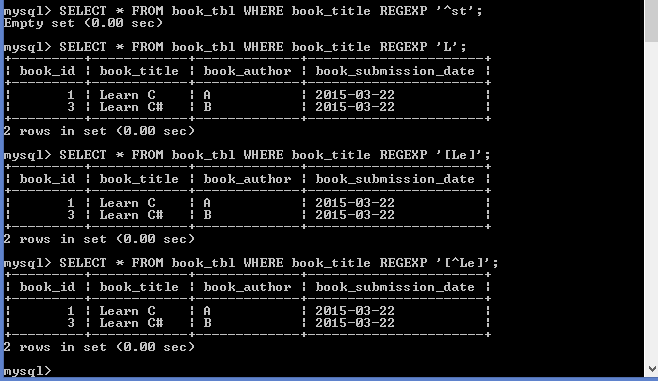

Occurrence is a nonnegative integer indicating the occurrence of the replace operation: The default is 1, meaning that Oracle begins the search at the first character of source_char. Position is a positive integer indicating the character of source_char where Oracle should begin the search. For more information on backreference expressions, please refer to the notes to "Oracle Regular Expression Support", Table C-1. If n is the backslash character in replace_string, then you must precede it with the escape character ( \\). The replace_string can contain up to 500 backreferences to subexpressions in the form \n, where n is a number from 1 to 9. If replace_string is a CLOB or NCLOB, then Oracle truncates replace_string to 32K. Replace_string can be of any of the datatypes CHAR, VARCHAR2, NCHAR, NVARCHAR2, CLOB, or NCLOB. For a listing of the operators you can specify in pattern, please refer to Appendix C, "Oracle Regular Expression Support". If the datatype of pattern is different from the datatype of source_char, Oracle Database converts pattern to the datatype of source_char. It is usually a text literal and can be of any of the datatypes CHAR, VARCHAR2, NCHAR, or NVARCHAR2. It is commonly a character column and can be of any of the datatypes CHAR, VARCHAR2, NCHAR, NVARCHAR2, CLOB or NCLOB. Source_char is a character expression that serves as the search value. For more information, please refer to Appendix C, "Oracle Regular Expression Support". This function complies with the POSIX regular expression standard and the Unicode Regular Expression Guidelines. The function returns VARCHAR2 if the first argument is not a LOB and returns CLOB if the first argument is a LOB. The string returned is in the same character set as source_char. By default, the function returns source_char with every occurrence of the regular expression pattern replaced with replace_string. REGEXP_REPLACE extends the functionality of the REPLACE function by letting you search a string for a regular expression pattern. My next goal is to get the shortcode provided by a syntax highlighting plugin replaced with a tag.Description of the illustration regexp_replace.gif Make sure you backup your database first though before doing any of this. WHERE post_content LIKE '%[my_shortcode%'

SET post_content = PREG_REPLACE('//', '', post_content)
MYSQL REGEX REPLACE UPDATE
Voila! And here’s how I removed a shortcode from all posts and pages: UPDATE wp_posts

MYSQL REGEX REPLACE INSTALL
So, install some libraries upon which the UDF may depend, download the UDF archive, extract it, browse to what has been extracted, configure, install and restart MySQL (just in case.) If you’re reading this and it’s not 2011, make sure you get the latest version and read the release notes too.Īt this point the UDF library is installed but the functions are not available yet, so log in to your MySQL command line, preferably as root and create your new preg_replace function like this: CREATE FUNCTION preg_replace RETURNS STRING SONAME 'lib_mysqludf_preg.so' I found a UDF for MySQL called lib_mysqludf_preg and here’s how I got it to run on Ubuntu 11.04, somewhere in a temporary directory: sudo apt-get install libpcre3-dev libmysqlclient-dev One simple solution would be to grab the database dump, perform various search and replace operations and then feed it back in, and my goal was to do that without data loss, without going offline, without sending files back and forth but mainly for learning purposes. I was dealing with a bunch of content issues like redundant shortcodes and post meta, URL changes, images directories and more. I’ve been working a lot with MySQL lately, especially after the major theme and plugin upgrades on my blog. Hey there! I'm currently working on a CLI tool to deploy WordPress apps to DigitalOcean.


 0 kommentar(er)
0 kommentar(er)
